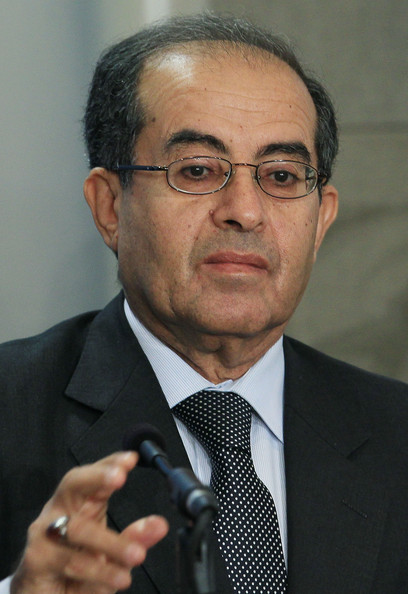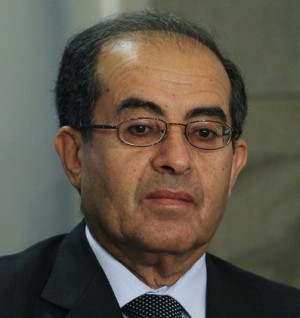Former Prime Minister Mahmoud Jibril sees security as the biggest challenge facing the country. He was speaking on Thursday in Tripoli . . .[restrict]in an exclusive interview with the Libya Herald’s Sami Zaptia.
SZ How would you define the so called ‘new Libya’?
MJ There are too many so-called ‘new Libyas’, but there are some commonalities in all of them. Whichever Libya you are talking about, it needs security and a national army.
There can be no rebuilding of the ‘new Libya’ without security. And without a national army there can be no security. These two are indispensable components for the rebuilding of the ‘new Libya’.
SZ So what would you say are the main challenges facing Libya over the next six months politically, socially and economically?
MJ As for the ‘new Libya’, irrespective of whatever political movement you represent, it is about development. It is about quality education, it is about housing, about health, transport, communications and employment for the youth who were responsible for the 17th February Revolution.
Libyans have been deprived of so much over the last 42 years, and whether you are liberal, Islamic or secular, it means nothing unless a development agenda is attached. To me, it is important how a person thinks as opposed to what he is politically wearing on the outside.
I think it not only applies to Libya’s revolution but to all the Arab Spring countries. We need to bring in the majority of the population and especially the youth as real partners.
We must make them feel that they can realize their dreams. They must feel that the blood they spilt was worth it.
If we do not, we leave open the opportunity for opportunists to jump in. This applies to all Arab Spring nations, not just Libya. Therefore, as I said, politically, the biggest challenge that faces Libya is that of security.
Economically, Libya faces a number of main challenges in my view. Firstly, there is the challenge of building an alternative economy based on knowledge-based services. We have to realize that we don’t have as much oil as we thought we did and so therefore we must utilize our reserves carefully. We are in a golden period that may last for only a maximum of 25 to 30 years.
Secondly, demographics. We have to engage in an aggressive demographic policy. Our population has decreased dramatically over the last few decades. It has fallen from a rate of increase of about 4.8 percent in the early 1990s to about 1.5 percent today. This is a very scary especially if you consider that the country is so large —about 1.76 million square kilometers. This presents a national security problem.
The third main challenge that faces Libya is that of water scarcity. Libya and the UAE both face the problem of being two of the countries with the least water resources in the world.
Therefore we need to build a knowledge-based service economy, concentrating on high technology projects, to bridge the gap that has developed over the last few decades with the rest of the world. Libya needs to engage in ‘spatial development’ in its periphery and especially on the border areas in order to occupy and secure its vast territory.
SZ In what kind of time frame do you think that this type of development can be achieved in Libya?
MJ In 2008, over 110 Libyan specialists created a document entitled the ‘Vision 2025’. This study was to break Libya’s dependence on oil. Unfortunately, very little of this study was implemented by the previous regime, and therefore if it is implemented say from 2012 I think the new vision of Libya can be achieved by 2030.
SJ What about challenges facing Libya on the social front?
MJ Socially, I do not think the tribal structure is as scary as it is made out to be.
On the contrary, the tribes have been very patriotic and have engaged in national reconciliation. So I do not think that is as big an issue as it is made out to be.
However, Libya is in need of a large awareness campaign. I think the country’s best and influential people should take the lead in a national awareness campaign on the constitution, elections, democracy, freedom and so forth. This is needed immediately.
Democracy is a culture, not just a model or structure. We need some deep social reconstruction. This involves education and the upbringing of children at home. It is learning how to live with a new free media. It’s learning about participation and tolerance.
SZ With the benefit of hindsight, as head of Libya’s first post-17 February Revolution Executive Office or prime minister, what would you have done differently if you could?
MJ With hindsight I should not have tolerated the interference of the legislative body, the NTC. But because we shared the same enemy and the same obligation, I swallowed and overlooked too many things. Or I should have resigned earlier.
SZ Do you think it was a right decision by you to resign when you did?
MJ Yes, it was the right decision. It was a decision I had announced and I needed to honour it and it was because of both the NTC and the foreign interference in Libyan affairs.
The NTC did not back me in my decision to dissolve the armed groups. At the time they were only about 18 groups. Today they are over 180 different armed groups.
SZ For what reasons should both foreign and local investors be optimistic about Libya’s economic and business future?
MJ I’m very optimistic. If Libya achieves security, Libya has the most unprecedented potential in the region.
SZ On what do you base that optimism? For example, you’ve previously said you think that there’s $480 billion worth of investment to be made by Libya over the next 20 years. Some people thought that was high. Do you still stand by that statement?
MJ A study released about three weeks ago confirmed that there is a potential investment of about $700 billion in North Africa and that two-thirds of that potential was expected from Libya alone. No, I still believe in that statement of $480 billion.
SZ What message would you like to send to Libyan people on the eve of first anniversary of the February 17 Revolution?
MJ My message to the Libyan people is that, firstly, this so-called chaos that exists in Libya is natural, even expected. It took the French Revolution 82 years to succeed. It has only been a year since Libya’s revolution started and only about four months since full liberation.
My second message to the Libyan people is that they should not be worried. I have realized that Libya’s youth have become very politically aware. They should not worry about the destiny of the revolution. The revolution was executed by the street of Libya – by the youth on the streets of Libya, and the youth are ready.
As long as there is a pregnant Libyan woman somewhere, there is hope. If some foreign powers who think there is chaos and that there is a political vacuum in Libya – it is a total miscalculation. National sovereignty is in the blood of every Libyan.
[/restrict]








